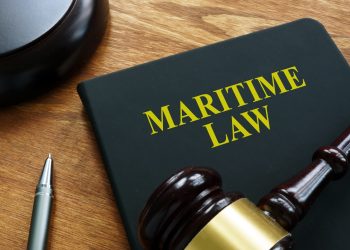As recent developments in shipping see a rising interest in blockchain technology, Beatrice Russ, Partner, Ince&Co and Joanne Waters, Senior Registered Foreign Lawyer, Ince&Co, explored expected advantages, as well as potential legal and commercial issues, with respect to the implementation of the new solutions.
In 2017, the maritime industry was awash with predictions of the potential for blockchain technology to enhance communication, allow transparency across the supply chain and thereby streamline traditionally paper-based trade processes. Ultimately, blockchain would be expected to combat the current fragmentation across the industry by making processes more efficient.
With announcements regarding the release of new blockchain-based products from both established and start-up companies appearing on a daily basis, this article seeks to explore the potential for the technology in the maritime industry and some of the legal questions its adoption raises.
What problems might blockchain solve?
The results of a Journal of Commerce survey issued in December 2017 regarding major complaints of shippers in relation to containerised cargo demonstrate the types of issues that blockchain technology could be used to address. They include:
1. No real-time visibility at any point in the supply chain and particularly during transhipment and intermodal transport;
2. No centralised means of allocation, with space allocated via local offices; and
3. A need to quickly adjust supply chain routes when disruption is encountered at one point.
An increase in transparency is not just a customer-driven requirement; with the renewed focus of regulatory authorities globally on eliminating corruption, slavery and environmentally adverse practices from supply chains, it is also a legal and reputational concern.
Blockchain promises a decentralised and immutable shared ledger, which all parties in a transaction can access. This provides real-time, indisputable information about a consignment, its provenance, location, condition and history. With higher transparency comes higher accountability, information no longer being passed along a chain from one contracting party to his immediate counterparty, but shared instead with all participants simultaneously addressing not just the customer complaints but also the legal and regulatory concerns.
Commercial questions
Whilst many technology companies are promising to deliver an entire, integrated blockchain solution for logistics and supply chain management, these are nascent and leave many practical and commercial questions unanswered, including the following:
1. All parties in a transaction will need to use the same platform, similar to the current e-bill of lading technology. It appears that there will be not one blockchain product but a number of competing products; would these be compatible with each other or would participants have to subscribe to a number of different products, with the associated duplicative costs of doing so?
2. With the creation of overlapping blockchain models comes a growing need for some form of international standardisation to promote interoperability. Will early participants have to adjust their practices later on to meet the new standards?
3. The proliferation of blockchain products means that some platforms will not survive in the competitive marketplace. How will the insolvency or takeover of a blockchain platform be managed?
4. Not all parties in a transaction, particularly intermediaries, will feel comfortable sharing their contracting or pricing data. Will it be possible to accommodate certain data or transactions outside of the main ledger, whilst maintaining the integrity of the distributed ledger model?
5. The availability and reliability of internet services and electricity is not universal – not all stakeholders involved in a supply chain will have the stable energy and internet supply required to fuel electronic processes. How can this be mitigated?
Legal issues
As is often the case with technological advances, the legal framework has been slow to catch up, with the limited regulation in place aimed at cryptocurrencies rather than the underlying technology. Nevertheless, the use of blockchain technologies raises a number of legal issues:
1. As a decentralised system, with no single fixed location, under what jurisdiction does the technology, and the data stored on it, fall?
2. As the system is designed so that no single entity controls it, who is liable in the event the system fails?
3. If the above can be established, does the applicable legal regime recognise electronic contracts and digital signatures and permit transactions to be carried out digitally? Taking e-bills of lading as an example, under English law, electronic documents do not come within the definition of “bill of lading” under the Carriage of Goods by Sea Act 1992, meaning the rules governing transfer of title to sue do not automatically apply.
4. Linked to the use of blockchain is the idea of a “smart” contract, a coding solution for managing self-executing contracts. Participants in such contracts will need to ask whether it qualifies as a “contract” for the purposes of applicable current legislation and will also need to consider issues of liability. If, for example, the contract self-executes incorrectly, who is responsible for the resulting losses?
5. The distributed nature of blockchain inevitably requires the electronic transfer of data across international borders. That is becoming the subject of increasing regulation and restrictions, most notably in the EU where the General Data Protection Regulation will come into force later this year and will impose stringent penalties for data mis-use and loss.
6. Competition and anti-trust – how will the sharing of pricing information be treated by competition authorities? If a “permissioned” blockchain is used, how will access be regulated? Could the regulation of access amount to behaviour that is considered anti-competitive?
Comment
Many companies and governments are focusing on the potential of blockchain to revolutionise business processes. This applies particularly to the maritime industry, which would stand to profit greatly from a uniform solution to its antiquated processes. However, it remains to be seen how widely-adopted these solutions will be and whether the industry will opt instead for other modified versions that are still being developed. In either case, the various legal and commercial issues identified above will have to be addressed if a system is to be arrived at that works for all. Given the breadth and complexity of the relevant considerations, the final form that is adopted by the industry is expected to take some time to be developed and agreed.
Companies are already seeking to identify the potential and applicability of blockchain in the logistics industry by running “demonstration tests” with a single shipment. We will be monitoring the results of these tests and the implementation of blockchain and will report further in due course.
By Beatrice Russ, Partner, Ince&Co, London, and Joanne Waters, Senior Registered Foreign Lawyer (England & Wales), Hong Kong
A version of this article originally appeared in Ince & Co’s Logistics Newsletter, published in association with the Chartered Institute of Logistics and Transport in Hong Kong, and is reproduced here with authors’ kind permission.
The views expressed in this article are solely those of the authors and do not necessarily represent those of SAFETY4SEA and are for information sharing and discussion purposes only.
About Beatrice Russ
 Beatrice is a partner of Ince&Co in the London office and a key member of its asset finance team. She focuses mainly on ship and energy finance with over 20 years’ experience in these areas but also handles other financing work, including restructuring and aviation finance. She has particular expertise in complex sale leaseback and export credit agency-backed financings, gained from her time in-house with the UK Export Credit Agency. Beatrice initially joined the firm’s Hamburg office in 2005 as a consultant, and relocated to London in 2012 where she has been a partner since 2015.
Beatrice is a partner of Ince&Co in the London office and a key member of its asset finance team. She focuses mainly on ship and energy finance with over 20 years’ experience in these areas but also handles other financing work, including restructuring and aviation finance. She has particular expertise in complex sale leaseback and export credit agency-backed financings, gained from her time in-house with the UK Export Credit Agency. Beatrice initially joined the firm’s Hamburg office in 2005 as a consultant, and relocated to London in 2012 where she has been a partner since 2015.
About Joanne Waters
 Joanne works within the Shipping Group dealing with shipping litigation and related admiralty, logistics and non-contentious work, including regulatory and compliance issues. Joanne acts for international clients mainly in the shipping and logistics sectors, including ship owners, charterers, freight forwarders and P&I Clubs, on cases involving English court and international arbitration proceedings. She also deals with general commercial litigation on issues such as defaults under international sale contracts, debt recovery and international insolvencies. Joanne was recently seconded for four months to Tokyo to help and advise the Japan P&I Association on their daily shipping matters and to act as in-house legal advisor on English law issues, on a broad range of P&I and FDD matters. She also gave a regular series of presentations and workshops to the claims handlers. Joanne trained and worked in London office before relocating to Hong Kong in 2015.
Joanne works within the Shipping Group dealing with shipping litigation and related admiralty, logistics and non-contentious work, including regulatory and compliance issues. Joanne acts for international clients mainly in the shipping and logistics sectors, including ship owners, charterers, freight forwarders and P&I Clubs, on cases involving English court and international arbitration proceedings. She also deals with general commercial litigation on issues such as defaults under international sale contracts, debt recovery and international insolvencies. Joanne was recently seconded for four months to Tokyo to help and advise the Japan P&I Association on their daily shipping matters and to act as in-house legal advisor on English law issues, on a broad range of P&I and FDD matters. She also gave a regular series of presentations and workshops to the claims handlers. Joanne trained and worked in London office before relocating to Hong Kong in 2015.

































































